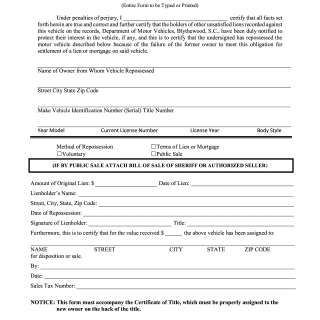SCDMV Form 4034. Affidavit for Repossessed Motor Vehicle
The SCDMV Form 4034 is an Affidavit for Repossessed Motor Vehicle designed and utilized by the South Carolina Department of Motor Vehicles. This form serves as a legal document that provides details regarding a motor vehicle that has been repossessed by a lender in the state of South Carolina.
The main purpose of this form is to declare the repossession of a motor vehicle and provide information about the vehicle, the borrower, and the lender. The form consists of several parts, including sections for personal and contact information of both parties, the vehicle's make, model, year, and VIN number, as well as detailed information about the repossession itself.
Important fields that must be filled out accurately include the borrower's name and contact information, the date of repossession, and the reason for repossession. Additionally, the lender must provide details about their right to repossess the vehicle, such as a copy of the loan agreement or security agreement.
When filling out the form, it is important to ensure that all required fields are completed accurately. The borrower and lender must sign the form, and a notary public must acknowledge the signatures.
In practice, this form is often used when a borrower defaults on a car loan, and the lender must repossess the vehicle. By completing this form, the lender protects its interests and declares the repossession legally.
Strengths of this form include providing a clear record of the repossession and protecting the interests of both parties. Weaknesses may include potential errors or omissions if the form is not completed accurately.
Alternative forms to consider may include the Uniform Commercial Code (UCC) financing statements or other state-specific repossession forms.
Once completed, the form can be submitted to the South Carolina DMV or stored by the lender as a legal record of the repossession. It is important to note that failure to file this form could result in legal implications for both parties involved.

